仁爱版英语八年级下册Unit7 Topic 1 复习课件 (共41张PPT)
文档属性
| 名称 | 仁爱版英语八年级下册Unit7 Topic 1 复习课件 (共41张PPT) | 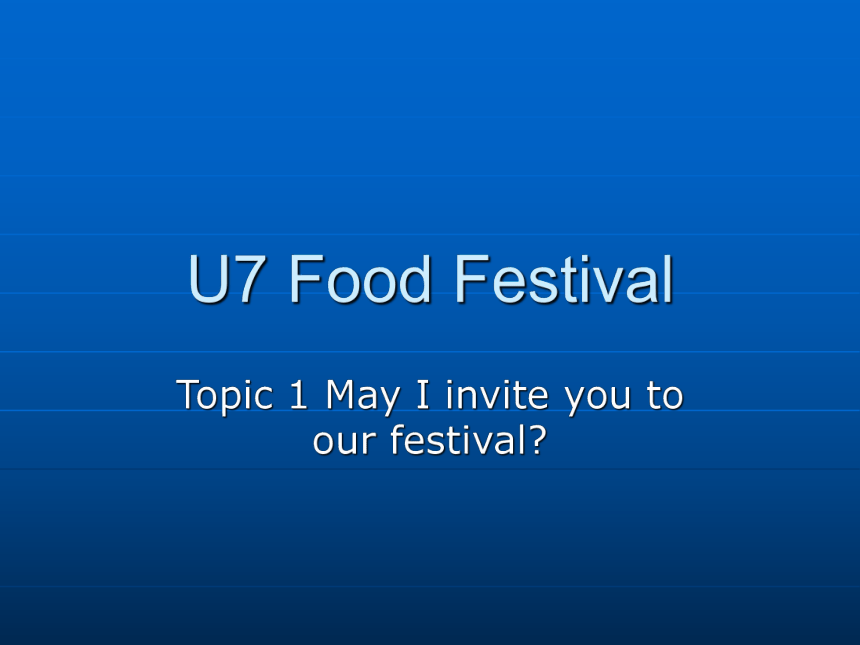 | |
| 格式 | zip | ||
| 文件大小 | 97.5KB | ||
| 资源类型 | 教案 | ||
| 版本资源 | 仁爱科普版 | ||
| 科目 | 英语 | ||
| 更新时间 | 2020-06-07 17:40:54 | ||
图片预览

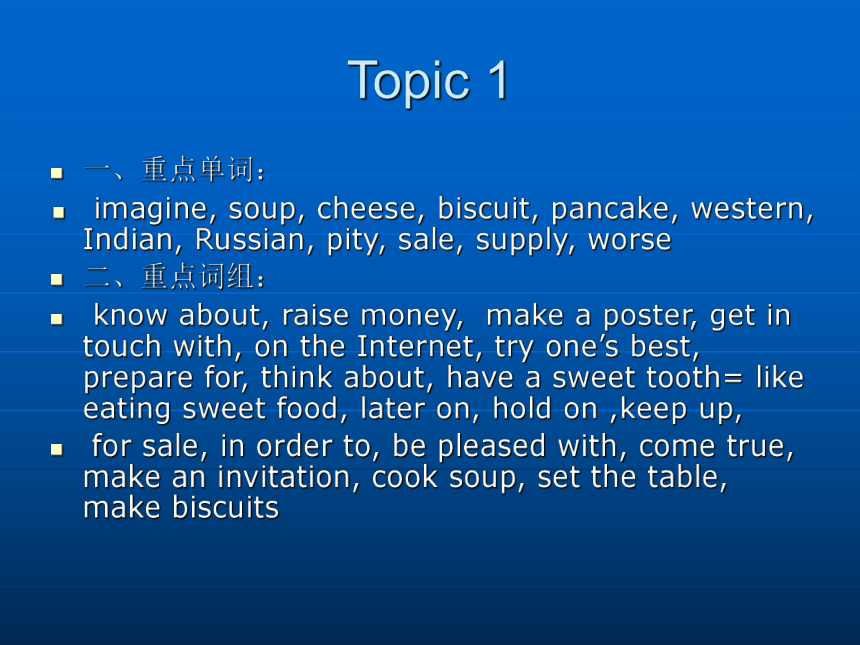
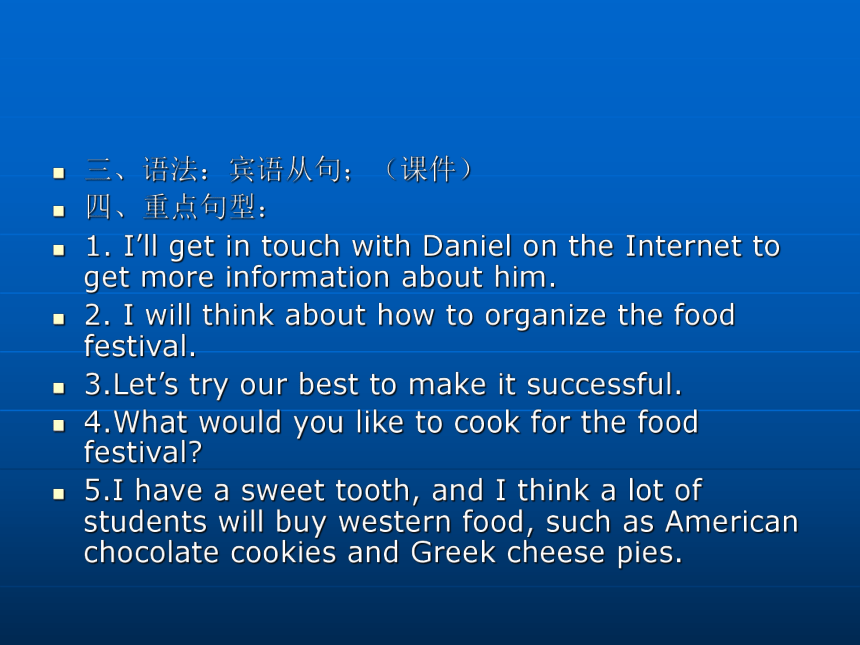
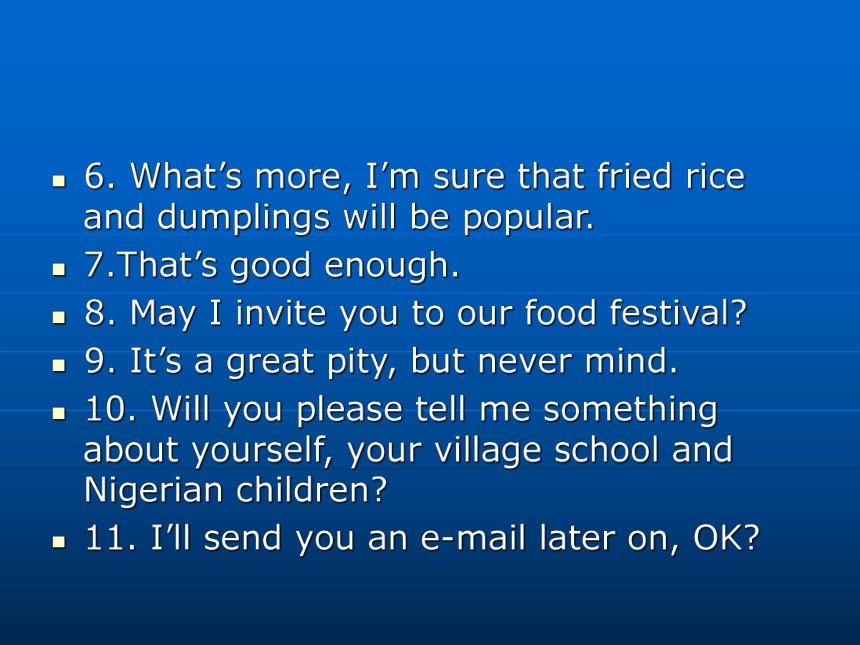
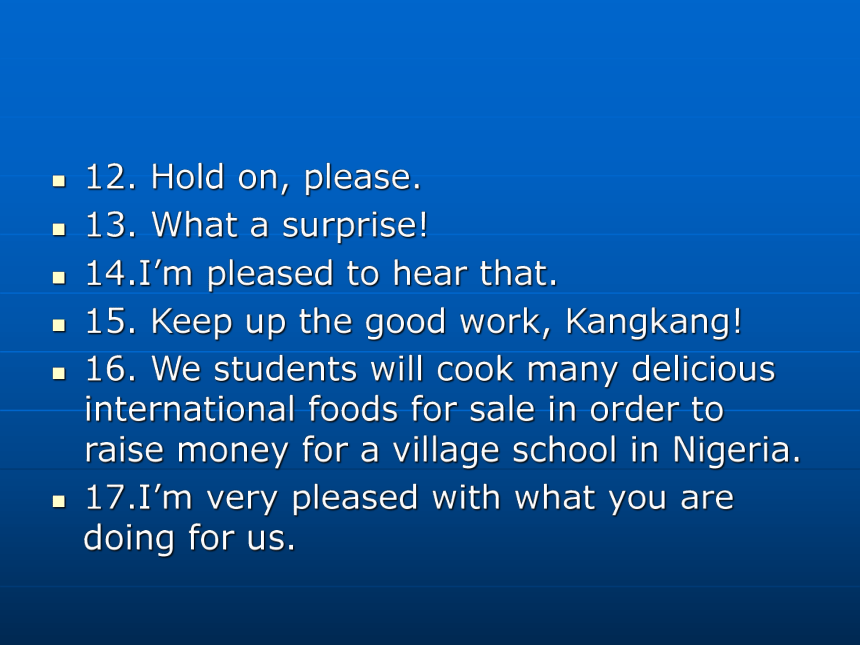
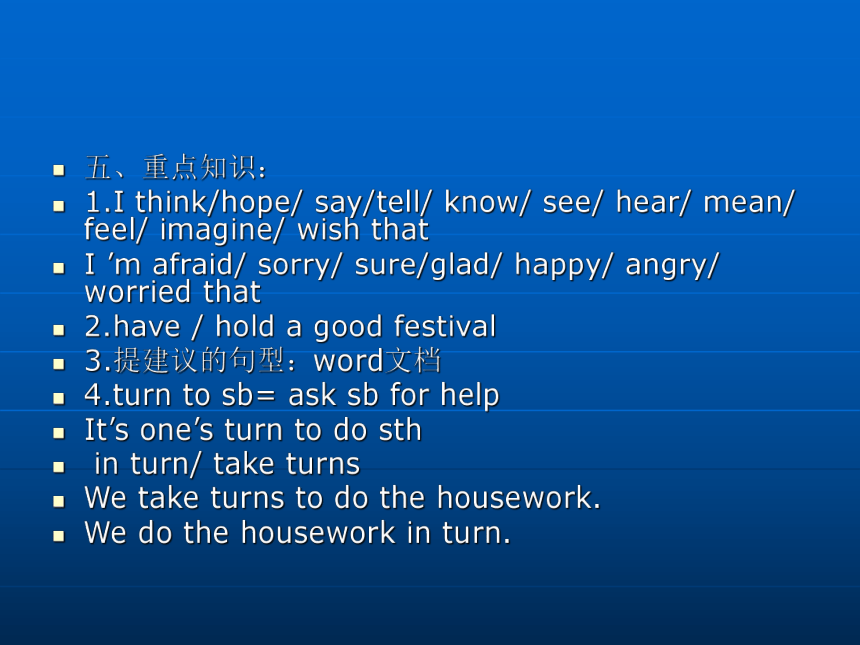
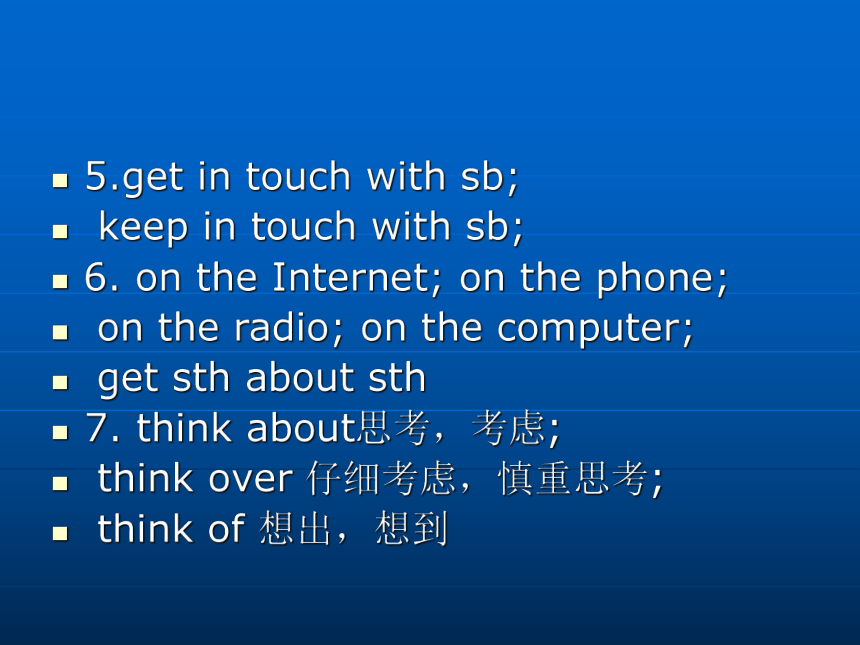
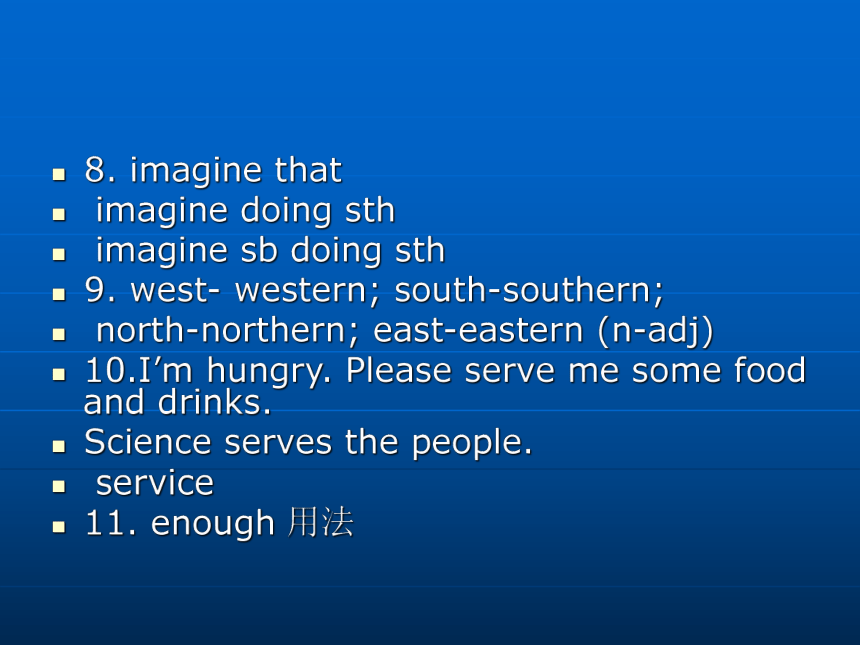
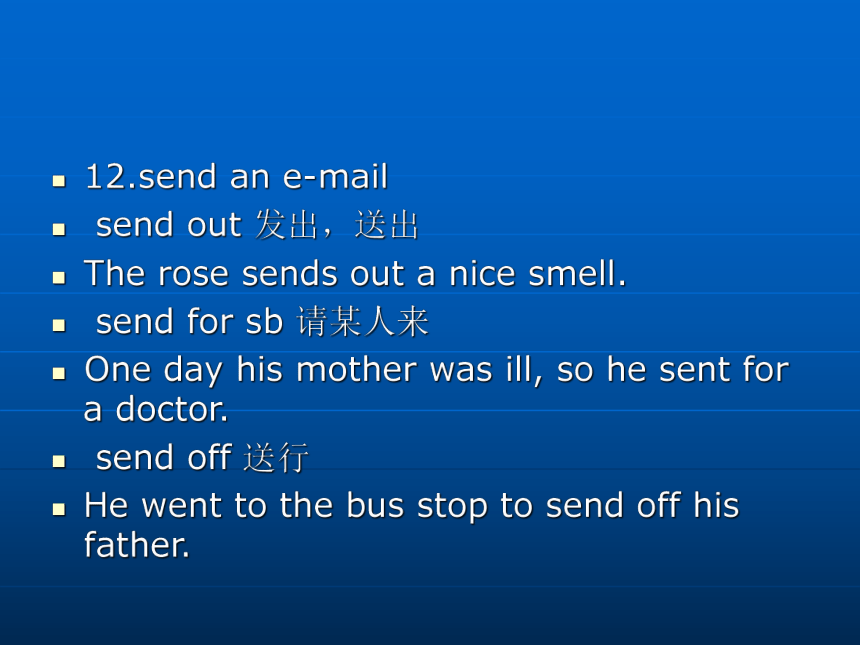

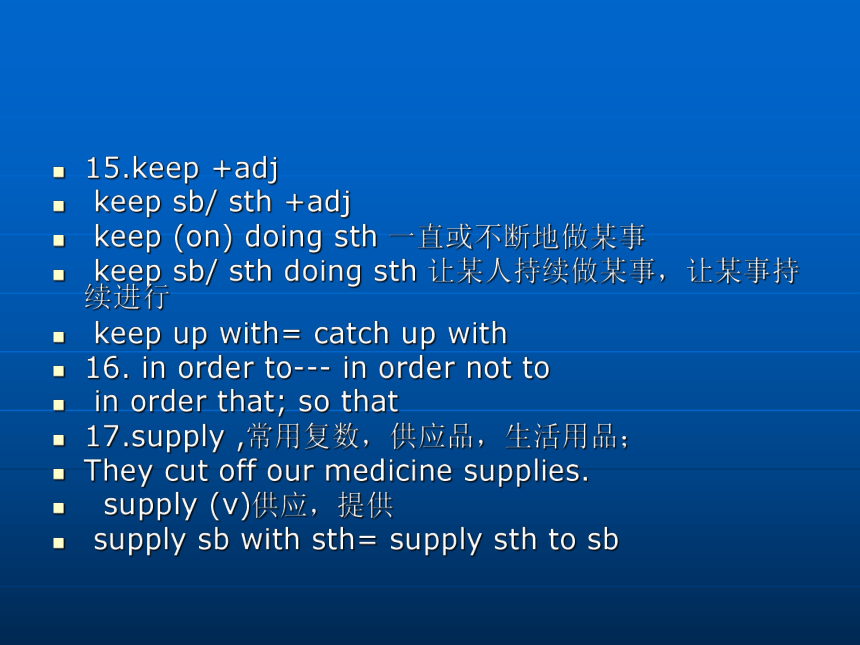
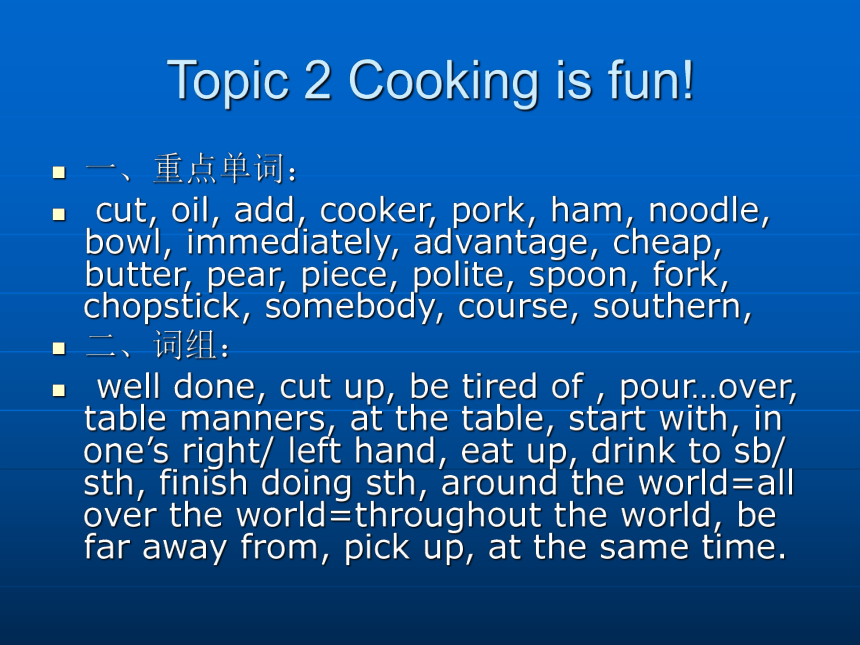
文档简介
(共41张PPT)
U7
Food
Festival
Topic
1
May
I
invite
you
to
our
festival?
Topic
1
一、重点单词:
imagine,
soup,
cheese,
biscuit,
pancake,
western,
Indian,
Russian,
pity,
sale,
supply,
worse
二、重点词组:
know
about,
raise
money,
make
a
poster,
get
in
touch
with,
on
the
Internet,
try
one’s
best,
prepare
for,
think
about,
have
a
sweet
tooth=
like
eating
sweet
food,
later
on,
hold
on
,keep
up,
for
sale,
in
order
to,
be
pleased
with,
come
true,
make
an
invitation,
cook
soup,
set
the
table,
make
biscuits
三、语法:宾语从句;(课件)
四、重点句型:
1.
I’ll
get
in
touch
with
Daniel
on
the
Internet
to
get
more
information
about
him.
2.
I
will
think
about
how
to
organize
the
food
festival.
3.Let’s
try
our
best
to
make
it
successful.
4.What
would
you
like
to
cook
for
the
food
festival?
5.I
have
a
sweet
tooth,
and
I
think
a
lot
of
students
will
buy
western
food,
such
as
American
chocolate
cookies
and
Greek
cheese
pies.
6.
What’s
more,
I’m
sure
that
fried
rice
and
dumplings
will
be
popular.
7.That’s
good
enough.
8.
May
I
invite
you
to
our
food
festival?
9.
It’s
a
great
pity,
but
never
mind.
10.
Will
you
please
tell
me
something
about
yourself,
your
village
school
and
Nigerian
children?
11.
I’ll
send
you
an
e-mail
later
on,
OK?
12.
Hold
on,
please.
13.
What
a
surprise!
14.I’m
pleased
to
hear
that.
15.
Keep
up
the
good
work,
Kangkang!
16.
We
students
will
cook
many
delicious
international
foods
for
sale
in
order
to
raise
money
for
a
village
school
in
Nigeria.
17.I’m
very
pleased
with
what
you
are
doing
for
us.
五、重点知识:
1.I
think/hope/
say/tell/
know/
see/
hear/
mean/
feel/
imagine/
wish
that
I
’m
afraid/
sorry/
sure/glad/
happy/
angry/
worried
that
2.have
/
hold
a
good
festival
3.提建议的句型:word文档
4.turn
to
sb=
ask
sb
for
help
It’s
one’s
turn
to
do
sth
in
turn/
take
turns
We
take
turns
to
do
the
housework.
We
do
the
housework
in
turn.
5.get
in
touch
with
sb;
keep
in
touch
with
sb;
6.
on
the
Internet;
on
the
phone;
on
the
radio;
on
the
computer;
get
sth
about
sth
7.
think
about思考,考虑;
think
over
仔细考虑,慎重思考;
think
of
想出,想到
8.
imagine
that
imagine
doing
sth
imagine
sb
doing
sth
9.
west-
western;
south-southern;
north-northern;
east-eastern
(n-adj)
10.I’m
hungry.
Please
serve
me
some
food
and
drinks.
Science
serves
the
people.
service
11.
enough
用法
12.send
an
e-mail
send
out
发出,送出
The
rose
sends
out
a
nice
smell.
send
for
sb
请某人来
One
day
his
mother
was
ill,
so
he
sent
for
a
doctor.
send
off
送行
He
went
to
the
bus
stop
to
send
off
his
father.
13.later
on
……后来,用在过去时
Later
on
he
got
a
job
as
a
clerk
in
a
bank.
later
on
再过些时候,用于将来时
He
will
call
me
up
later
on.
some
time+
later,
过了…用于过去时
He
arrived
in
London
on
Monday,
and
two
days
later
he
left
for
New
York.
sooner
or
later;
see
you
later,
14.
please
(v)
You
can’t
please
everybody.
Sit
down,
please.感叹词
be
pleased
with
sb/
sth;
be
pleased
to
do
sth
a
pleasing
effect
15.keep
+adj
keep
sb/
sth
+adj
keep
(on)
doing
sth
一直或不断地做某事
keep
sb/
sth
doing
sth
让某人持续做某事,让某事持续进行
keep
up
with=
catch
up
with
16.
in
order
to---
in
order
not
to
in
order
that;
so
that
17.supply
,常用复数,供应品,生活用品;
They
cut
off
our
medicine
supplies.
supply
(v)供应,提供
supply
sb
with
sth=
supply
sth
to
sb
Topic
2
Cooking
is
fun!
一、重点单词:
cut,
oil,
add,
cooker,
pork,
ham,
noodle,
bowl,
immediately,
advantage,
cheap,
butter,
pear,
piece,
polite,
spoon,
fork,
chopstick,
somebody,
course,
southern,
二、词组:
well
done,
cut
up,
be
tired
of
,
pour…over,
table
manners,
at
the
table,
start
with,
in
one’s
right/
left
hand,
eat
up,
drink
to
sb/
sth,
finish
doing
sth,
around
the
world=all
over
the
world=throughout
the
world,
be
far
away
from,
pick
up,
at
the
same
time.
三、重点句型:
1.
I’m
glad
that
you
are
trying
to
help
others.
2.
It’s
very
kind
of
you.
3.Cooking
is
fun!
4.First,…Second,…
Next,…Then,…After
that,…
Finally,…
5.Would
you
mind
if
we
learn
to
make
it
from
you?
6.Practice
makes
perfect.
7.Jane
works
harder.
8.I
don’t
know
if
there’s
no
need
for
knives,
forks
or
chopsticks.
9.The
dinner
always
starts
with
a
small
dish.
10.
Maybe
you
don’t
know
whether
it’s
polite
or
not
to
speak
loudly
at
the
table.
11.Remember
not
to
drink
too
much.
12.If
you
can’t
remember
these
rules,
just
do
as
other
people
do.
13.People
around
the
world
have
different
eating
habits.
14.Do
you
know
if
people
in
the
south
of
China
often
eat
noodles?
四、重点知识:
1.
be
kind
to
sb
It’s
very
kind
of
you.
It
is
kind
of
you
to
do
sth.
It
is
important
for
you
to
do
sth.
kind表示的是of后边人称的特点,特征或性格,类似的形容词有good,
nice,
wise,
clever,
cruel
important不表示for后边人称的特点等情况,而有“对于某人来说”之意
a
kind
of;
many
kinds
of;
all
kinds
of;
different
kinds
of;
of
a
kind同一种类有
2.
doing相当于形容词作定语,表示动作正在进行,主动
done
相当于形容词作定语,表示动作的完成,被动
boiling
water
进行
boiled
water
完成
an
exciting
day
主动
a
used
stamp
被动
3.Then
you
can
look
for
something
new
to
add
to
your
collection.
If
you
add
five
to
five,
you
can
get
ten.
Please
add
up
these
numbers.
My
whole
school
education
adds
up
to
no
more
than
two
years.
4.
cut
up
sth/
cut
sth
up
cut
sth
into
pieces
cut
up…finally;
fry
the
meat
lightly;
add
the
rice
slowly;
put
the
noodles
in
a
bowl
immediately;
5.
Would
you
mind
if…?
Would
you
mind
doing?
Would
you
mind
not
doing?
Would
you
mind
one’s
doing?
回答带有mind的问句时,注意yes或no都是针对mind选用的,表示介意时,用yes,后面跟的句子是不让对方做某事,如:Sorry,
you’d
better
not.
I’m
afraid
you
can’t.
I
wish
you
wouldn’t…;
I’m
sorry,
but
it’s
not
allowed…;
I’d
rather
you
don’t.
表示不介意时,用no,后边跟的句子是允许对方做某事。如:No,
of
course
not.
No,
certainly
not.
No,
not
at
all.
Sure
not.
No,
go
ahead.
No,
please
(do).
No,
do
as
you
like.
6.
learn
to
do
sth
from
sb;
learn
sth
from
sb
7.副词的最高级前可省略the
Li
Jun
jumps
highest
in
our
class.
8.whether/
if
区别:
1)
whether
引导的宾语从句可以移到句首,if
则不能
I
can’t
say
whether
this
is
true
or
not.=
Whether
this
is
true
or
not,
I
can’t
say.
2)介词之后的宾语从句,用whether,不用if
I’m
interested
in
whether
she
likes
English.
3)不定式前用whether,不用if
She
asked
me
whether
to
start
early.
4)whether可引导其他从句,如主语从句,表语从句等,if则不能
It
is
uncertain
whether
he
will
come.
5)
if
除了是否的意思,还有如果,假如之意,用在条件状语从句中
He
is
going
to
Beijing
if
it
doesn’t
rain
tomorrow.
9.need
需要,必要,不可数名词
There
is
no
need
for
shouting.
need
危难,困窘时,不可数名词
A
friend
in
need
is
a
friend
indeed.
need需要的东西,需求,可数名词
We
can’t
always
have
enough
money
to
meet
our
needs.
10.
why的用法:
1)
用于特殊疑问句
Why
are
you
in
such
a
hurry?
2)表示惊讶等感情
Why,
what
a
big
apple
you
have.
3)用于日常交际用语,承上启下,“怎么啦”
Kumiko,
is
it
too
hot?
No,
why?
Well,
in
Cuba
you
shouldn’t
eat
so
noisily.
4)引导名词性从句
Why
he
didn’t
come
here
was
a
secret.
5)引导定语从句,只能修饰reason
This
is
the
reason
why
I
left
early.
6)句型why
not+动词原形用来提建议
Why
not
try
it
again?
11.
have
(no)
manners
have
good/
bad
manners
It
is
bad
manners
to
talk
with
a
full
mouth.
12.
eat
up
sth/
eat
sth
up
use
up/
drink
up
13.drink
to
sb/sth
raise
one’s
glass
raise
one’s
hand,
raise
one’s
eyes举目,仰视,
raise
a
family,
raise
money
take
a
sip
at
the
table
坐或站在桌子旁边,在美式英语中,指就餐
at
table
英式英语,吃饭,就餐
on
the
table在桌面上
14.
as
当…时候;因为;像;按照;
Do
as
I
say.
15.
course
(cn)
a
four-course
dinner
course
(cn)课程,讲座
There’s
going
to
an
oral
English
training
course.
Topic
3
Welcome
to
our
food
festival!
一、重点单词:
lady,
gentleman,
satisfy,
menu,
wine,
bill,
lemonade,
salad,
Coke,
worth,
effort
二、重点词组:
take
one’s
order,
soft
drink,
main
course,
healthy
eating,
balanced
diet,
in
short,
not
only…
but
also
三、语法:副词的比较级和最高级
(课件)
1.变化规则:
单音节词和少数双音节词:
1)一般情况在词尾加-er,-est:
hard-harder-
hardest;
fast-
faster-
fastest;
2)以字母e结尾的只加-r,-st:
late-later-latest;
3)以辅音字母加y结尾的,先变y为i,再加-er,-est:
early
-earlier-
earliest
多音节词和部分双音节词,在词前加more,
most:
quickly-
more
quickly-
most
quickly;
由形容词通过加后缀ly派生的副词的比较级和最高级通常加more,
most
2.不规则变化:
well-
better-
best;
badly-
worse-
worst;
little-
less-
least;
much-
more-
most;
far-
farther/
further—farthest/
furthest
3.用法:原级;比较级;最高级
注意:1)副词的比较级前也可以用even,
still,
a
lot,
a
bit,
far,
much,
a
little
2)表示越……越……时,用the+形容词或副词比较级,
the+形容词或副词比较级
The
more
regularly
we
eat,
the
healthier
we
are.
3)
表示越来越……时,用比较级+and+比较级,或
more
and
more+原级
The
boy
runs
faster
and
faster.
The
train
went
more
and
more
slowly,
and
at
last
it
stopped.
4)副词最高级转换成比较级时,被比较的对象就用any
other+单数名词,或the
other
+复数名词,排除主语本身,
Mark
works
hardest
in
his
class.
Mark
works
harder
than
any
other
student
in
his
class.
Mark
works
harder
than
the
other
students
in
his
class.
5)有些副词没有比较级和最高级:
specially特殊地,
excellently极好地,
perfectly完美地,
mainly,
very非常,
simply简单地
四、重点句型:
1.I
hope
everyone
has
a
wonderful
time.
2.Let’s
wish
them
success!
3.
Here’s
a
table
for
two.
4.May
I
take
your
order?
5.May
I
have
the
bill?
6.Here’s
your
change.
7.Could
I
order
a
meal
by
phone?
8.We’ll
send
the
food
to
you
in
twenty
minutes.
9.
…,
and
the
result
were
worth
the
effort.
10.
Jane
cooks
more
successfully
than
she/
her.
11.
First,
we
need
to
have
enough
food,
never
too
much
or
too
little.
12.Second,
it’s
very
important
for
us
to
have
a
balanced
diet.
13.It’s
said
that
half
of
the
student
don’t
have
a
regular
breakfast
or
don’t
eat
anything
at
all
in
the
morning.
14.
In
short,
we
should
not
only
eat
enouhg,
good
and
healthy
food
but
also
eat
regularly.
15.
The
more
regularly
we
eat,
the
healthier
we
are.
16.
Not
all
students
have
a
regular
breakfast.
五、重点知识:
1.for
sale
It’s
not
for
sale.
the
sale
of
cars
The
book
sold
well.
All
books
are
on
sale
on
National
Day.出售;上市;减价出售
2.
satisfy
sb;
be
satisfied
with;
satisfying;
3.pay
the
bill;
the
phone
bill;
a
ten-dollar
bill;
4.Don’t
forget
your
change.
I’m
going
to
make
some
changes
in
this
room.
Take
two
changes
with
you.换洗的衣服
He
changed
the
date
of
the
meeting.
Water
will
change
into
ice
if
it
is
cold
enough.
5.1)adj+n+ed
short
–
sighted近视的,目光短浅的;
short
–handed人手短缺的;
light-
hearted心情轻松的;
cold-
blooded;
good-
tempered;
old-
fashioned
2)
n+adj
snow-white;
color-
blind;
manlike;
3)
adj+adj
red-
hot
炽热的
4)
n+
doing
peace-
loving;
earthshaking
震惊世界的
5)
n+
done
man-made;
handmade
6)
adj+
doing
good-looking;
hard-
working
7)
adj+
done
half-
baked;
hard-
won
来之不易的
8)
n+
n+ed
iron-
hearted
铁石心肠的
9)
num+
n
400-
metre
10)
adv+
done:
well-
known
6.He
ordered
a
plate
of
fish.
by+n/
doing/
交通工具
7.
send…
to…
He
sent
the
message
to
me
yesterday.
send
up
发射,发生,把…送上去
in+
一段时间,……之后,用将来时,用how
soon提问
8.staple
通常用复数形式出现,一般指家庭常备的,
主要的食品,“主食”
These
people
live
on
the
staples
of
rice
and
vegetables.
course常以复数形式出现,指家庭常吃的菜,“主菜”
We
had
a
three-course
dinner.
The
main
course
was
roast
duck.
9.
be
worth
sth;
be
worth
doing
sth;
be
well
worth
doing
10.有些副词和形容词同词根,表示具体意义,若在这些副词后面加上后缀ly就变成了具有抽象意义的方式副词,不具备可测性
We
decided
to
go
deeper
into
the
jungle.
I
am
deeply
moved.
Open
your
mouth
wide.
The
idea
is
now
widely
accepted.
He
jumped
high.
Everyone
speaks
highly
of
him.
11.
It
is
said
that…
It
is
reported
that…
It
is
known
that…
It
is
believed
that…
It
is
thought
that…
12.not
only…but
also…不但,而且;通常连接两个对等成分,可连接名词,动词或介词短语;
not
only…
but
also…连接主语时,谓语动词的人称和数就服从就近原则,最靠近谓语动词的部分,即but
also
后面的部分,
Not
only
I
but
also
he
likes
English.
not
only置于句首时,需要倒装,
而后面but
also
后面不倒装
Not
only
does
he
compose
music,
but
also
he
plays.
not
only…but
also…,
both…
and…两都可互换,两者的否定形式都是neither…nor…
13.
not
与all,
everything,
everyone,
everybody,
both
等代词连胜,表示部分否定;若表示全部否定用none,
nothing,
nobody,
no
one,
neither
14.
副词:
1)本身就是副词:now,
rather,
very,
here,
how,
when
,too
2)与形容词形式相同的副词:early,
late,
high,
wide,
deep
3)
由形容词+ly构成的副词:
slow-slowly;
quick-
quickly;
brave-
bravely;
careful-
carefully;
4)一些形容词本身既可作副词,加ly后也为副词,但意义变了:
late–
lately;
fair–
fairly
公正地-相当地
5)有些以ly结尾的词是形容词,而不是副词:dead死的–
deadly致命有;
live
活的-
lively活泼的;
friendly
U7
Food
Festival
Topic
1
May
I
invite
you
to
our
festival?
Topic
1
一、重点单词:
imagine,
soup,
cheese,
biscuit,
pancake,
western,
Indian,
Russian,
pity,
sale,
supply,
worse
二、重点词组:
know
about,
raise
money,
make
a
poster,
get
in
touch
with,
on
the
Internet,
try
one’s
best,
prepare
for,
think
about,
have
a
sweet
tooth=
like
eating
sweet
food,
later
on,
hold
on
,keep
up,
for
sale,
in
order
to,
be
pleased
with,
come
true,
make
an
invitation,
cook
soup,
set
the
table,
make
biscuits
三、语法:宾语从句;(课件)
四、重点句型:
1.
I’ll
get
in
touch
with
Daniel
on
the
Internet
to
get
more
information
about
him.
2.
I
will
think
about
how
to
organize
the
food
festival.
3.Let’s
try
our
best
to
make
it
successful.
4.What
would
you
like
to
cook
for
the
food
festival?
5.I
have
a
sweet
tooth,
and
I
think
a
lot
of
students
will
buy
western
food,
such
as
American
chocolate
cookies
and
Greek
cheese
pies.
6.
What’s
more,
I’m
sure
that
fried
rice
and
dumplings
will
be
popular.
7.That’s
good
enough.
8.
May
I
invite
you
to
our
food
festival?
9.
It’s
a
great
pity,
but
never
mind.
10.
Will
you
please
tell
me
something
about
yourself,
your
village
school
and
Nigerian
children?
11.
I’ll
send
you
an
later
on,
OK?
12.
Hold
on,
please.
13.
What
a
surprise!
14.I’m
pleased
to
hear
that.
15.
Keep
up
the
good
work,
Kangkang!
16.
We
students
will
cook
many
delicious
international
foods
for
sale
in
order
to
raise
money
for
a
village
school
in
Nigeria.
17.I’m
very
pleased
with
what
you
are
doing
for
us.
五、重点知识:
1.I
think/hope/
say/tell/
know/
see/
hear/
mean/
feel/
imagine/
wish
that
I
’m
afraid/
sorry/
sure/glad/
happy/
angry/
worried
that
2.have
/
hold
a
good
festival
3.提建议的句型:word文档
4.turn
to
sb=
ask
sb
for
help
It’s
one’s
turn
to
do
sth
in
turn/
take
turns
We
take
turns
to
do
the
housework.
We
do
the
housework
in
turn.
5.get
in
touch
with
sb;
keep
in
touch
with
sb;
6.
on
the
Internet;
on
the
phone;
on
the
radio;
on
the
computer;
get
sth
about
sth
7.
think
about思考,考虑;
think
over
仔细考虑,慎重思考;
think
of
想出,想到
8.
imagine
that
imagine
doing
sth
imagine
sb
doing
sth
9.
west-
western;
south-southern;
north-northern;
east-eastern
(n-adj)
10.I’m
hungry.
Please
serve
me
some
food
and
drinks.
Science
serves
the
people.
service
11.
enough
用法
12.send
an
send
out
发出,送出
The
rose
sends
out
a
nice
smell.
send
for
sb
请某人来
One
day
his
mother
was
ill,
so
he
sent
for
a
doctor.
send
off
送行
He
went
to
the
bus
stop
to
send
off
his
father.
13.later
on
……后来,用在过去时
Later
on
he
got
a
job
as
a
clerk
in
a
bank.
later
on
再过些时候,用于将来时
He
will
call
me
up
later
on.
some
time+
later,
过了…用于过去时
He
arrived
in
London
on
Monday,
and
two
days
later
he
left
for
New
York.
sooner
or
later;
see
you
later,
14.
please
(v)
You
can’t
please
everybody.
Sit
down,
please.感叹词
be
pleased
with
sb/
sth;
be
pleased
to
do
sth
a
pleasing
effect
15.keep
+adj
keep
sb/
sth
+adj
keep
(on)
doing
sth
一直或不断地做某事
keep
sb/
sth
doing
sth
让某人持续做某事,让某事持续进行
keep
up
with=
catch
up
with
16.
in
order
to---
in
order
not
to
in
order
that;
so
that
17.supply
,常用复数,供应品,生活用品;
They
cut
off
our
medicine
supplies.
supply
(v)供应,提供
supply
sb
with
sth=
supply
sth
to
sb
Topic
2
Cooking
is
fun!
一、重点单词:
cut,
oil,
add,
cooker,
pork,
ham,
noodle,
bowl,
immediately,
advantage,
cheap,
butter,
pear,
piece,
polite,
spoon,
fork,
chopstick,
somebody,
course,
southern,
二、词组:
well
done,
cut
up,
be
tired
of
,
pour…over,
table
manners,
at
the
table,
start
with,
in
one’s
right/
left
hand,
eat
up,
drink
to
sb/
sth,
finish
doing
sth,
around
the
world=all
over
the
world=throughout
the
world,
be
far
away
from,
pick
up,
at
the
same
time.
三、重点句型:
1.
I’m
glad
that
you
are
trying
to
help
others.
2.
It’s
very
kind
of
you.
3.Cooking
is
fun!
4.First,…Second,…
Next,…Then,…After
that,…
Finally,…
5.Would
you
mind
if
we
learn
to
make
it
from
you?
6.Practice
makes
perfect.
7.Jane
works
harder.
8.I
don’t
know
if
there’s
no
need
for
knives,
forks
or
chopsticks.
9.The
dinner
always
starts
with
a
small
dish.
10.
Maybe
you
don’t
know
whether
it’s
polite
or
not
to
speak
loudly
at
the
table.
11.Remember
not
to
drink
too
much.
12.If
you
can’t
remember
these
rules,
just
do
as
other
people
do.
13.People
around
the
world
have
different
eating
habits.
14.Do
you
know
if
people
in
the
south
of
China
often
eat
noodles?
四、重点知识:
1.
be
kind
to
sb
It’s
very
kind
of
you.
It
is
kind
of
you
to
do
sth.
It
is
important
for
you
to
do
sth.
kind表示的是of后边人称的特点,特征或性格,类似的形容词有good,
nice,
wise,
clever,
cruel
important不表示for后边人称的特点等情况,而有“对于某人来说”之意
a
kind
of;
many
kinds
of;
all
kinds
of;
different
kinds
of;
of
a
kind同一种类有
2.
doing相当于形容词作定语,表示动作正在进行,主动
done
相当于形容词作定语,表示动作的完成,被动
boiling
water
进行
boiled
water
完成
an
exciting
day
主动
a
used
stamp
被动
3.Then
you
can
look
for
something
new
to
add
to
your
collection.
If
you
add
five
to
five,
you
can
get
ten.
Please
add
up
these
numbers.
My
whole
school
education
adds
up
to
no
more
than
two
years.
4.
cut
up
sth/
cut
sth
up
cut
sth
into
pieces
cut
up…finally;
fry
the
meat
lightly;
add
the
rice
slowly;
put
the
noodles
in
a
bowl
immediately;
5.
Would
you
mind
if…?
Would
you
mind
doing?
Would
you
mind
not
doing?
Would
you
mind
one’s
doing?
回答带有mind的问句时,注意yes或no都是针对mind选用的,表示介意时,用yes,后面跟的句子是不让对方做某事,如:Sorry,
you’d
better
not.
I’m
afraid
you
can’t.
I
wish
you
wouldn’t…;
I’m
sorry,
but
it’s
not
allowed…;
I’d
rather
you
don’t.
表示不介意时,用no,后边跟的句子是允许对方做某事。如:No,
of
course
not.
No,
certainly
not.
No,
not
at
all.
Sure
not.
No,
go
ahead.
No,
please
(do).
No,
do
as
you
like.
6.
learn
to
do
sth
from
sb;
learn
sth
from
sb
7.副词的最高级前可省略the
Li
Jun
jumps
highest
in
our
class.
8.whether/
if
区别:
1)
whether
引导的宾语从句可以移到句首,if
则不能
I
can’t
say
whether
this
is
true
or
not.=
Whether
this
is
true
or
not,
I
can’t
say.
2)介词之后的宾语从句,用whether,不用if
I’m
interested
in
whether
she
likes
English.
3)不定式前用whether,不用if
She
asked
me
whether
to
start
early.
4)whether可引导其他从句,如主语从句,表语从句等,if则不能
It
is
uncertain
whether
he
will
come.
5)
if
除了是否的意思,还有如果,假如之意,用在条件状语从句中
He
is
going
to
Beijing
if
it
doesn’t
rain
tomorrow.
9.need
需要,必要,不可数名词
There
is
no
need
for
shouting.
need
危难,困窘时,不可数名词
A
friend
in
need
is
a
friend
indeed.
need需要的东西,需求,可数名词
We
can’t
always
have
enough
money
to
meet
our
needs.
10.
why的用法:
1)
用于特殊疑问句
Why
are
you
in
such
a
hurry?
2)表示惊讶等感情
Why,
what
a
big
apple
you
have.
3)用于日常交际用语,承上启下,“怎么啦”
Kumiko,
is
it
too
hot?
No,
why?
Well,
in
Cuba
you
shouldn’t
eat
so
noisily.
4)引导名词性从句
Why
he
didn’t
come
here
was
a
secret.
5)引导定语从句,只能修饰reason
This
is
the
reason
why
I
left
early.
6)句型why
not+动词原形用来提建议
Why
not
try
it
again?
11.
have
(no)
manners
have
good/
bad
manners
It
is
bad
manners
to
talk
with
a
full
mouth.
12.
eat
up
sth/
eat
sth
up
use
up/
drink
up
13.drink
to
sb/sth
raise
one’s
glass
raise
one’s
hand,
raise
one’s
eyes举目,仰视,
raise
a
family,
raise
money
take
a
sip
at
the
table
坐或站在桌子旁边,在美式英语中,指就餐
at
table
英式英语,吃饭,就餐
on
the
table在桌面上
14.
as
当…时候;因为;像;按照;
Do
as
I
say.
15.
course
(cn)
a
four-course
dinner
course
(cn)课程,讲座
There’s
going
to
an
oral
English
training
course.
Topic
3
Welcome
to
our
food
festival!
一、重点单词:
lady,
gentleman,
satisfy,
menu,
wine,
bill,
lemonade,
salad,
Coke,
worth,
effort
二、重点词组:
take
one’s
order,
soft
drink,
main
course,
healthy
eating,
balanced
diet,
in
short,
not
only…
but
also
三、语法:副词的比较级和最高级
(课件)
1.变化规则:
单音节词和少数双音节词:
1)一般情况在词尾加-er,-est:
hard-harder-
hardest;
fast-
faster-
fastest;
2)以字母e结尾的只加-r,-st:
late-later-latest;
3)以辅音字母加y结尾的,先变y为i,再加-er,-est:
early
-earlier-
earliest
多音节词和部分双音节词,在词前加more,
most:
quickly-
more
quickly-
most
quickly;
由形容词通过加后缀ly派生的副词的比较级和最高级通常加more,
most
2.不规则变化:
well-
better-
best;
badly-
worse-
worst;
little-
less-
least;
much-
more-
most;
far-
farther/
further—farthest/
furthest
3.用法:原级;比较级;最高级
注意:1)副词的比较级前也可以用even,
still,
a
lot,
a
bit,
far,
much,
a
little
2)表示越……越……时,用the+形容词或副词比较级,
the+形容词或副词比较级
The
more
regularly
we
eat,
the
healthier
we
are.
3)
表示越来越……时,用比较级+and+比较级,或
more
and
more+原级
The
boy
runs
faster
and
faster.
The
train
went
more
and
more
slowly,
and
at
last
it
stopped.
4)副词最高级转换成比较级时,被比较的对象就用any
other+单数名词,或the
other
+复数名词,排除主语本身,
Mark
works
hardest
in
his
class.
Mark
works
harder
than
any
other
student
in
his
class.
Mark
works
harder
than
the
other
students
in
his
class.
5)有些副词没有比较级和最高级:
specially特殊地,
excellently极好地,
perfectly完美地,
mainly,
very非常,
simply简单地
四、重点句型:
1.I
hope
everyone
has
a
wonderful
time.
2.Let’s
wish
them
success!
3.
Here’s
a
table
for
two.
4.May
I
take
your
order?
5.May
I
have
the
bill?
6.Here’s
your
change.
7.Could
I
order
a
meal
by
phone?
8.We’ll
send
the
food
to
you
in
twenty
minutes.
9.
…,
and
the
result
were
worth
the
effort.
10.
Jane
cooks
more
successfully
than
she/
her.
11.
First,
we
need
to
have
enough
food,
never
too
much
or
too
little.
12.Second,
it’s
very
important
for
us
to
have
a
balanced
diet.
13.It’s
said
that
half
of
the
student
don’t
have
a
regular
breakfast
or
don’t
eat
anything
at
all
in
the
morning.
14.
In
short,
we
should
not
only
eat
enouhg,
good
and
healthy
food
but
also
eat
regularly.
15.
The
more
regularly
we
eat,
the
healthier
we
are.
16.
Not
all
students
have
a
regular
breakfast.
五、重点知识:
1.for
sale
It’s
not
for
sale.
the
sale
of
cars
The
book
sold
well.
All
books
are
on
sale
on
National
Day.出售;上市;减价出售
2.
satisfy
sb;
be
satisfied
with;
satisfying;
3.pay
the
bill;
the
phone
bill;
a
ten-dollar
bill;
4.Don’t
forget
your
change.
I’m
going
to
make
some
changes
in
this
room.
Take
two
changes
with
you.换洗的衣服
He
changed
the
date
of
the
meeting.
Water
will
change
into
ice
if
it
is
cold
enough.
5.1)adj+n+ed
short
–
sighted近视的,目光短浅的;
short
–handed人手短缺的;
light-
hearted心情轻松的;
cold-
blooded;
good-
tempered;
old-
fashioned
2)
n+adj
snow-white;
color-
blind;
manlike;
3)
adj+adj
red-
hot
炽热的
4)
n+
doing
peace-
loving;
earthshaking
震惊世界的
5)
n+
done
man-made;
handmade
6)
adj+
doing
good-looking;
hard-
working
7)
adj+
done
half-
baked;
hard-
won
来之不易的
8)
n+
n+ed
iron-
hearted
铁石心肠的
9)
num+
n
400-
metre
10)
adv+
done:
well-
known
6.He
ordered
a
plate
of
fish.
by+n/
doing/
交通工具
7.
send…
to…
He
sent
the
message
to
me
yesterday.
send
up
发射,发生,把…送上去
in+
一段时间,……之后,用将来时,用how
soon提问
8.staple
通常用复数形式出现,一般指家庭常备的,
主要的食品,“主食”
These
people
live
on
the
staples
of
rice
and
vegetables.
course常以复数形式出现,指家庭常吃的菜,“主菜”
We
had
a
three-course
dinner.
The
main
course
was
roast
duck.
9.
be
worth
sth;
be
worth
doing
sth;
be
well
worth
doing
10.有些副词和形容词同词根,表示具体意义,若在这些副词后面加上后缀ly就变成了具有抽象意义的方式副词,不具备可测性
We
decided
to
go
deeper
into
the
jungle.
I
am
deeply
moved.
Open
your
mouth
wide.
The
idea
is
now
widely
accepted.
He
jumped
high.
Everyone
speaks
highly
of
him.
11.
It
is
said
that…
It
is
reported
that…
It
is
known
that…
It
is
believed
that…
It
is
thought
that…
12.not
only…but
also…不但,而且;通常连接两个对等成分,可连接名词,动词或介词短语;
not
only…
but
also…连接主语时,谓语动词的人称和数就服从就近原则,最靠近谓语动词的部分,即but
also
后面的部分,
Not
only
I
but
also
he
likes
English.
not
only置于句首时,需要倒装,
而后面but
also
后面不倒装
Not
only
does
he
compose
music,
but
also
he
plays.
not
only…but
also…,
both…
and…两都可互换,两者的否定形式都是neither…nor…
13.
not
与all,
everything,
everyone,
everybody,
both
等代词连胜,表示部分否定;若表示全部否定用none,
nothing,
nobody,
no
one,
neither
14.
副词:
1)本身就是副词:now,
rather,
very,
here,
how,
when
,too
2)与形容词形式相同的副词:early,
late,
high,
wide,
deep
3)
由形容词+ly构成的副词:
slow-slowly;
quick-
quickly;
brave-
bravely;
careful-
carefully;
4)一些形容词本身既可作副词,加ly后也为副词,但意义变了:
late–
lately;
fair–
fairly
公正地-相当地
5)有些以ly结尾的词是形容词,而不是副词:dead死的–
deadly致命有;
live
活的-
lively活泼的;
friendly
同课章节目录
- Unit 5 Feeling excited
- Topic 1 You look excited
- Topic 2 I’m feeling better now.
- Topic 3 Many things can affect our feelings.
- Unit 6 Enjoying Cycling
- Topic 1 We're going on a three-day visit to Mount
- Topic 2 How about exploring Tian’anmen Square?
- Topic 3 Bicycle riding is good exercise.
- Unit 7 Food festival
- Topic 1 We’re preparing for a food festival.
- Topic 2 I’m not sure whether I can cook it well.
- Topic 3 I Cooked the Most Successfully
- Unit 8 Our Clothes
- Topic 1 We will have a class fashion show.
- Topic 2 We can design our own uniforms.
- Topic 3 He said the fashion show was wonderful.
